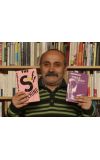
20 May 2011 07:51:32
An Istanbul-based publisher and his translator face obscenity charges for publishing Burroughs' novel, "The Soft Machine," and the same arguments about morality, literature and social value that shaped the American debate in the early 1960s are unfolding today.
"The book lacks narrative unity, while it is written in an arbitrary fashion that is devoid of cohesion in meaning," a Turkish government board said in a March ruling. "The way the book deals with the coarse, sleazy, vulgar and weak aspects of humans will develop an attitude that allows the justification of criminal activities in the readers' minds."
Decades ago, a court in Boston banned Burroughs' most prominent work, "Naked Lunch," after concluding it was obscene. A higher court reversed the ruling a few years later after testimony in the book's defense by poet Allen Ginsberg and writer Norman Mailer.
Burroughs' raw depictions of heroin addiction and homosexuality are hard to digest for some in Turkey, whose mostly Muslim population of 74 million is steeped in old traditions.
The case is part of a debate about free expression under a government that has successfully battled over Turkey's secular political system with the military and other hostile state institutions. The ruling party, led by devout Muslims who call themselves "conservative democrats," leads in the polls ahead of June elections, but opponents say its vows to pursue democratic reform mask an autocratic streak.
On Sunday, protesters in Turkish cities demonstrated against government plans to implement Internet content filters, saying the new system amounted to more censorship in an already heavy-handed effort to control information. Thousands of websites are banned under regulations aimed at curbing child pornography, illegal gambling and other cybercrimes.
Publisher Irfan Sanci printed 2,500 copies of Burroughs' novel, meaning a tiny fraction of Turks would see a hard copy. An advisory panel, the Prime Ministerial Board for the Protection of Children from Harmful Publications, said the book was not literature and was obscene because of its graphic descriptions of sex.
Article 226 of the penal code says its provisions "shall not apply to scientific, artistic and literary works" in some cases.

